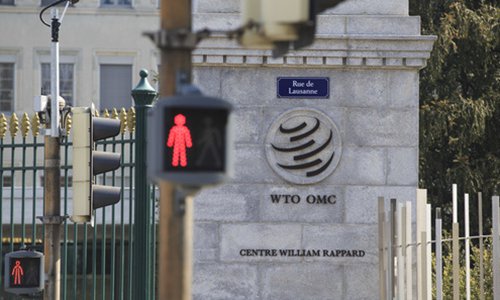HOME >> BUSINESS
WTO ruling undermines US credibility as trade talks head for deal
By Chu Daye Source:Global Times Published: 2019/10/22 20:42:23

File photo taken on April 2, 2019 shows the WTO logo on the main gate of the World Trade Organization (WTO) in Geneva, Switzerland. Photo:Xinhua
A ruling by the WTO has underlined US' non-compliance with the rule-based global trading system, Chinese analysts said on Tuesday.
China is seeking in retaliatory sanctions involving annual trade volume of $2.4 billion against the US for failing to comply with a WTO ruling, following imposing of tariffs by the US on certain Chinese products including solar panels and steel parts back in 2012, according to a document published on Monday on WTO's website.
Chinese analysts said that while the WTO's Dispute Settlement Body (DSB) proceedings follows its own timeline, the document's appearance undermined the credibility of the US administration in its trade argument with China, in a coincidence at a time the world observe the prospect inking of a so-called phase 1 agreement in the China-US trade talks.
DSB will review the Obama-era case, involving Chinese exports that valued at $7.3 billion back in 2012, at a meeting on October 28.
Li Yong, deputy chair of expert committee of China Association of International Trade, said that the ruling showed to the world that the US has, since long time ago, indulged itself in unilateral trade actions based on its domestic laws rather than agreed, rule-based multilateral system to its trading partners.
"While pointing fingers at China, the US is itself a longtime non-compliant of global trade rule," Li told the Global Times on Tuesday.
The WTO's dispute body effectively gave China a green light to seek compensatory sanctions in mid-August, according to Reuters.
Gary Liu Shengjun, head of the China Financial Reform Institute in Shanghai, said the trade dispute between the world's two largest economies have many dimensions, from structural to technical.
"However, the WTO DSB ruling is a nominal win for China," Liu told the Global Times.
The report surfaced as US President Donald Trump announced on Monday that work on a US-China trade agreement was coming along well.
On Friday, Trump said a trade deal between the two countries will be signed by the time the Asia-Pacific Economic Cooperation meetings take place in Chile in mid-November.
China has long expressed that US has taken a series of actions in serious violation of WTO rules, damaging the authority of the global trade body's dispute settlement mechanism, according to a while paper on China's stance on the China-US trade war issued in June.
But the outcomes of this specific trade dispute will unlikely has any impact on the big picture of the trade talks, which involves much broader topics, experts noted.
"Still, it is a message to the US: You cannot do whatever you want, and there are international rules to follow," Li said.
China continued to use the WTO dispute settlement channel to launch its complaints against the US, and it filed a case on US imposition of 15 percent tariffs on $300 billion Chinese goods in September.